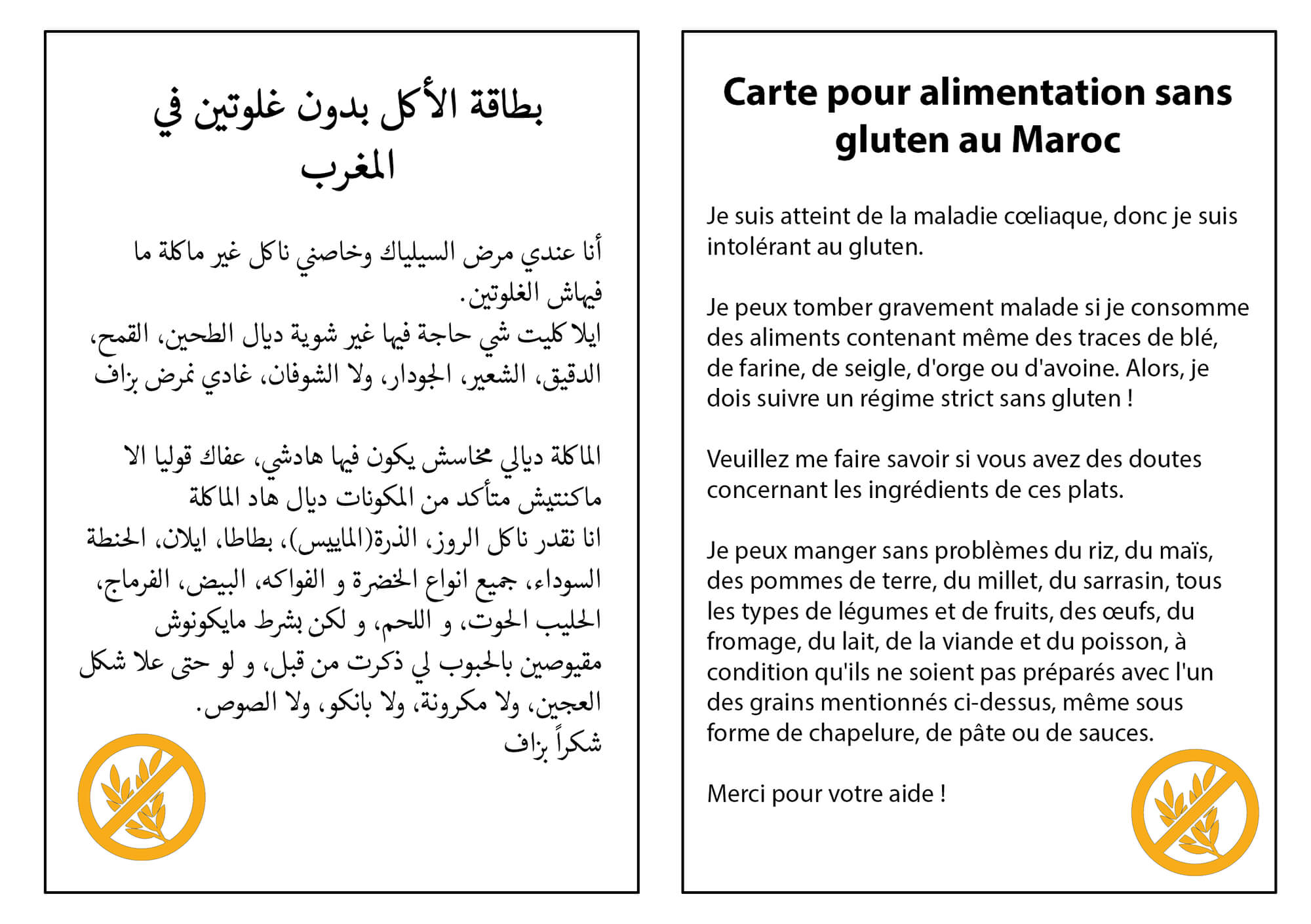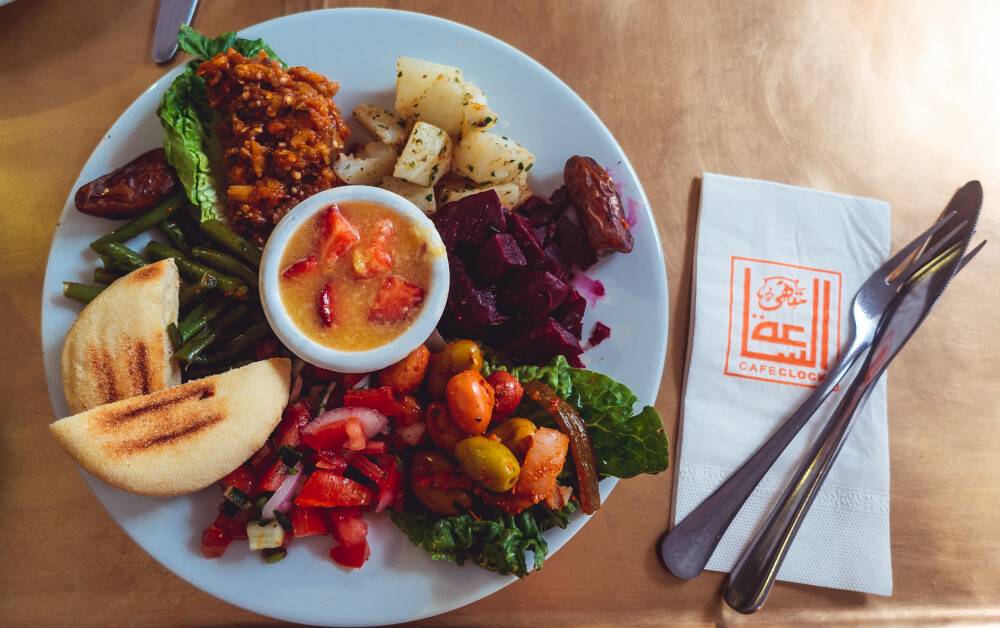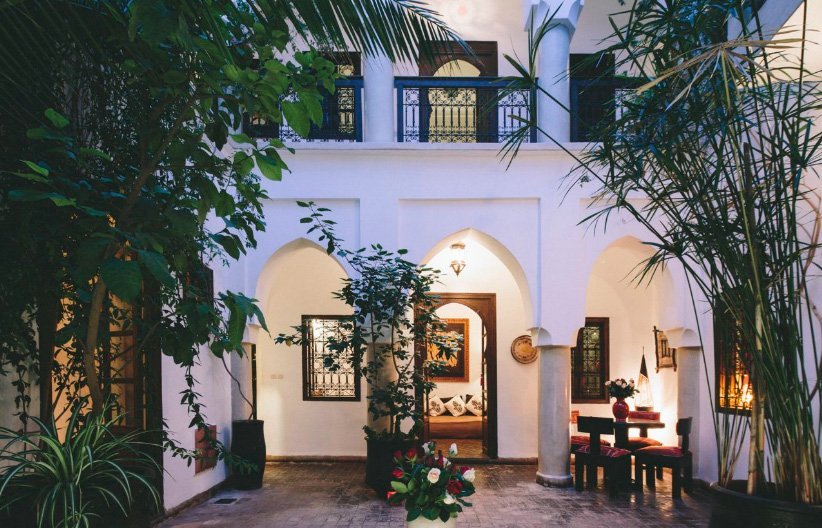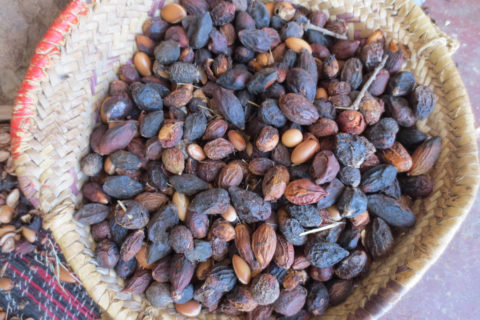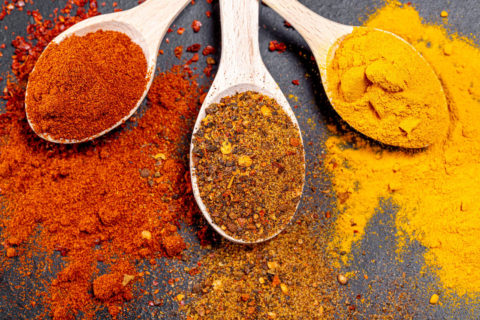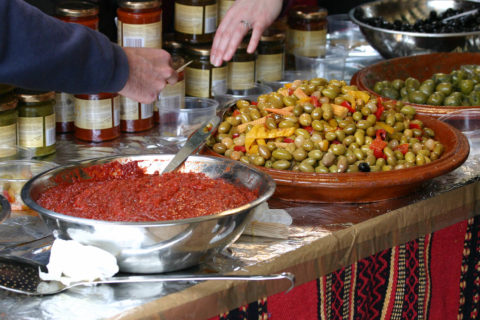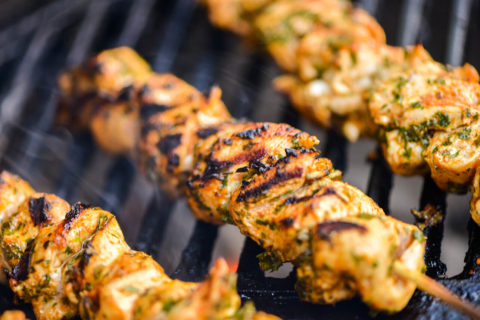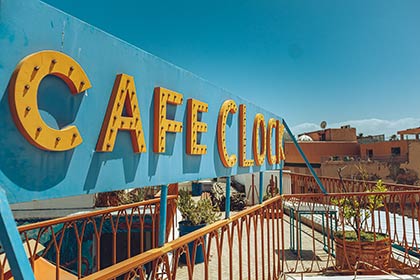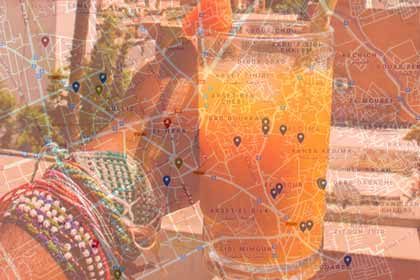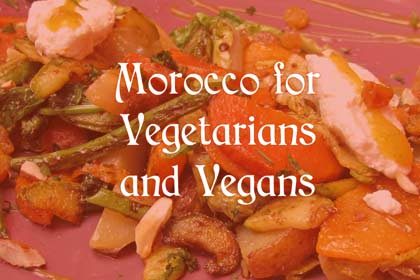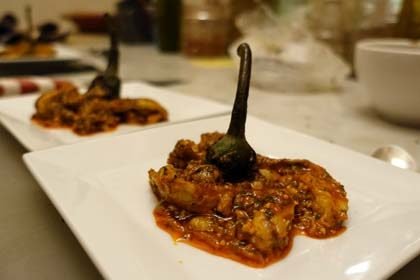Planning a trip to Morocco with a gluten intolerance or celiac disease might feel like a challenge. After all, bread plays a central role in Moroccan cuisine, and avoiding it can seem daunting. However, with the right preparation, navigating Morocco’s culinary landscape gluten-free can be easier than you think. This guide offers practical tips and insights to help you enjoy your trip without compromising your health.
Morocco’s culinary culture can feel overwhelming if you need to follow a gluten-free diet. However, don’t let this discourage you. With a bit of research and thoughtful choices, your Moroccan experience can transform from intimidating to enjoyable.
Contents
- 1 What is Celiac disease?
- 2 Staying gluten-free in Morocco
- 3 Communicating your gluten-free needs
- 4 Beware of foods containing gluten
- 5 Enjoying gluten-free food in Morocco
- 6 Gluten-free shopping in Marrakech
- 7 Managing nut allergies in Morocco
- 8 Gluten-free restaurants in Marrakech
- 9 Gluten-free accommodation options in Marrakech
- 10 Conclusion
- 11 Frequently Asked Questions about gluten-free food in Morocco
What is Celiac disease?
Celiac disease is an autoimmune disorder triggered by consuming gluten. For those of us with celiac disease, even a small amount of gluten can damage the small intestine and cause health issues. A strict gluten-free diet isn’t just a preference—it’s a necessity.
Staying gluten-free in Morocco
Awareness in Morocco
While larger Moroccan cities are becoming more aware of the Western concept of dietary restrictions thanks to tourism, the concept of “gluten-free” is still not widely understood. You’ll need to assert yourself—never feel compelled to eat food that could harm you.
Preparing for your trip
Preparation and flexibility are your allies when traveling gluten-free in Morocco. Before your trip, research restaurants, especially those with gluten-free options or flexible menus. Staying in accommodations that offer a kitchen can make meal preparation easier. Bringing a supply of gluten-free basics from home if they’re hard to find in Morocco can save you in a pinch.
Communicating your gluten-free needs
Communication makes all the difference. Therefore, always communicate your dietary needs, particularly when you dine in someone’s home. Being explicit about what you can and cannot eat often leads to better meals and fewer misunderstandings. In Morocco, the most common languages are Arabic (Darija) and French. Learn some key phrases in Arabic or French to explain your dietary needs clearly.
Consistently asking detailed questions about food ingredients in a foreign language can feel tiring. To simplify things, I recommend carrying a bilingual card detailing your dietary restrictions. Consider preparing a laminated card in French and Arabic (Darija).
I’ve created a downloadable ‘Celiac Card’. You can print it out and carry it with you or save it on your cell phone.
This document contains the following explanation and lists common gluten-containing items.
I have celiac disease and must follow a strict gluten-free diet.
If I eat anything that contains even a small amount of flour, wheat, barley, malt, or oats, I may have severe health issues.
Please let me know if you are unsure about the ingredients in these dishes.
I can eat rice, corn, potatoes, millet, buckwheat, all types of vegetables and fruits, eggs, cheese, milk, meat, and fish, as long as they are not prepared with any of the above-mentioned grains, even in the form of breadcrumbs, dough, or sauces.
Thank you for your help!
Beware of foods containing gluten
While avoiding obvious sources like bread and pastries is straightforward, some dishes contain hidden gluten. Here are some common Moroccan foods to avoid or ask about:
Harira
This flavourful soup, made with lentils, chickpeas, tomatoes, and fragrant spices, is one of the most cherished Moroccan dishes and a Ramadan staple. However, it’s often thickened with flour, which makes it unsuitable for gluten-sensitive individuals. If you see Harira on the menu, always ask how it’s prepared.
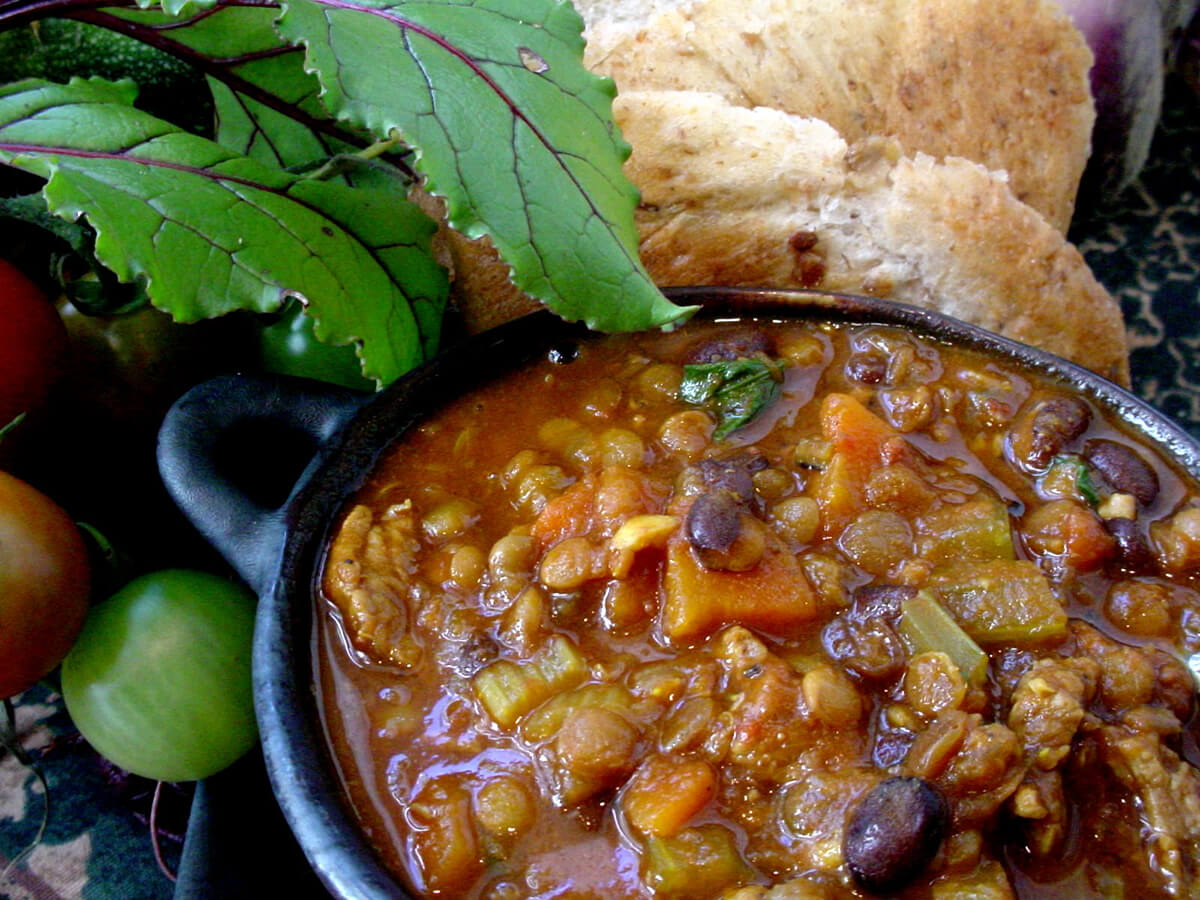
Briouats and B’stila
B’stila, a traditional Andalusian-Moroccan pie typically filled with chicken or offal, and Briouats, its smaller, triangular cousin, are wrapped in wheat-based dough and baked or fried. They are best avoided if you’re gluten-intolerant.
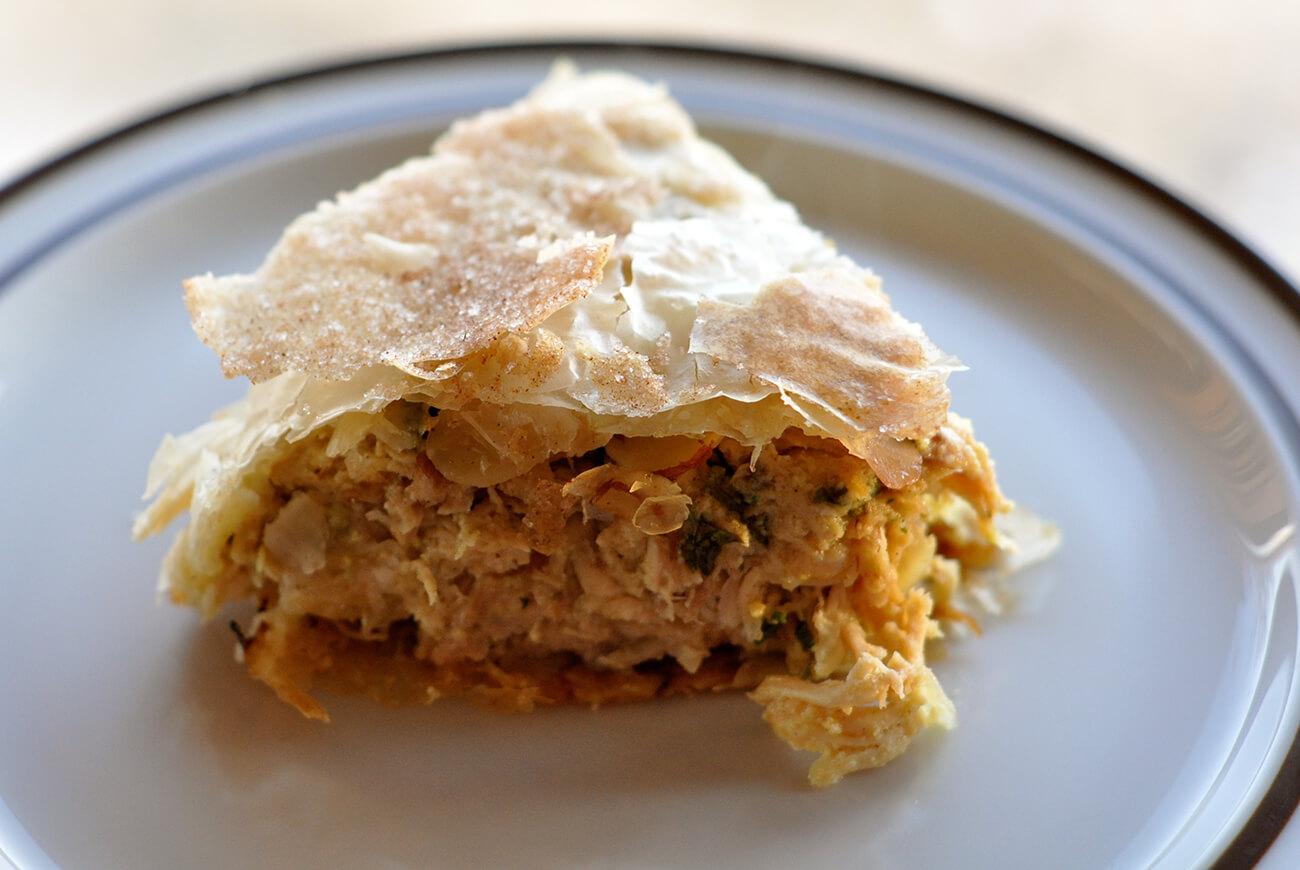
Couscous
Traditional couscous is made from wheat flour, which makes it a no-go for celiacs. While wheat is the standard, corn and barley options exist but are rare in restaurants. Some riads in Marrakech may offer alternatives. If you’re gluten-sensitive rather than allergic, consider a rice substitute or cornmeal couscous (known as bdez) at certain accommodations.
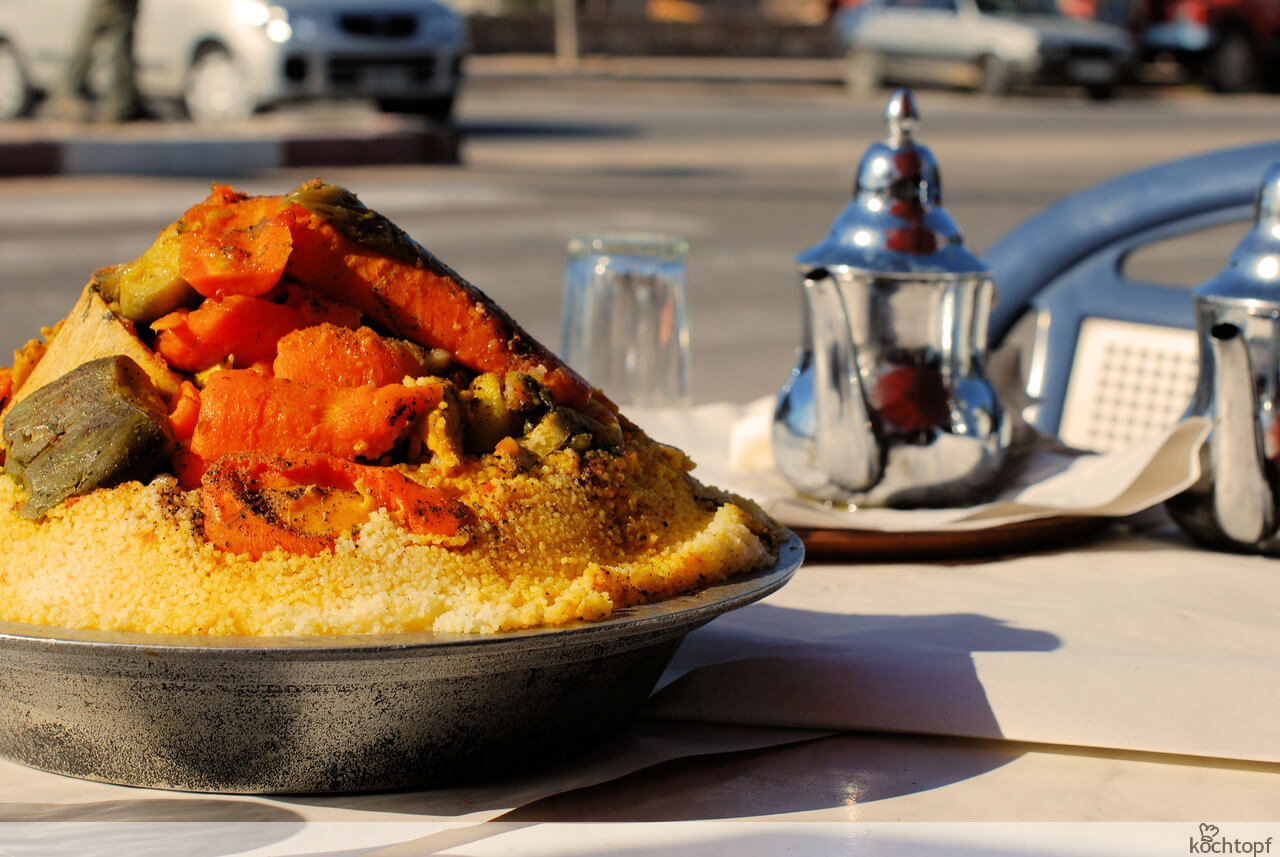
Most Pastries
Moroccan pastries are typically made with wheat flour and are not suitable for gluten-free travelers. However, you might find some nut-based options.
Other foods to be cautious of
Here is a list of dishes that often contain gluten:
- Bocadillo: A popular baguette sandwich filled with tuna or eggs.
- Dchicha: A wheat-based soup.
- Harcha: A pan-fried flatbread made with semolina flour.
- Maakouda: Potato cakes that are usually made with flour.
- Ma’amoul: Shortbread cookies are typically stuffed with dates, walnuts, or pistachios.
- Seffa: Sweetened couscous with cinnamon, sugar, and almonds.
Enjoying gluten-free food in Morocco
Luckily, Morocco offers naturally gluten-free dishes with sparing use of dairy. Here are some gluten-free dishes you can enjoy.
Classic Moroccan Dishes
- Tajine: A slow-cooked stew, named after the pot it’s cooked in. However, just confirm that no flour has been used to thicken the broth. Traditionally, Tajine gets eaten using bread, but you can easily request a fork instead.
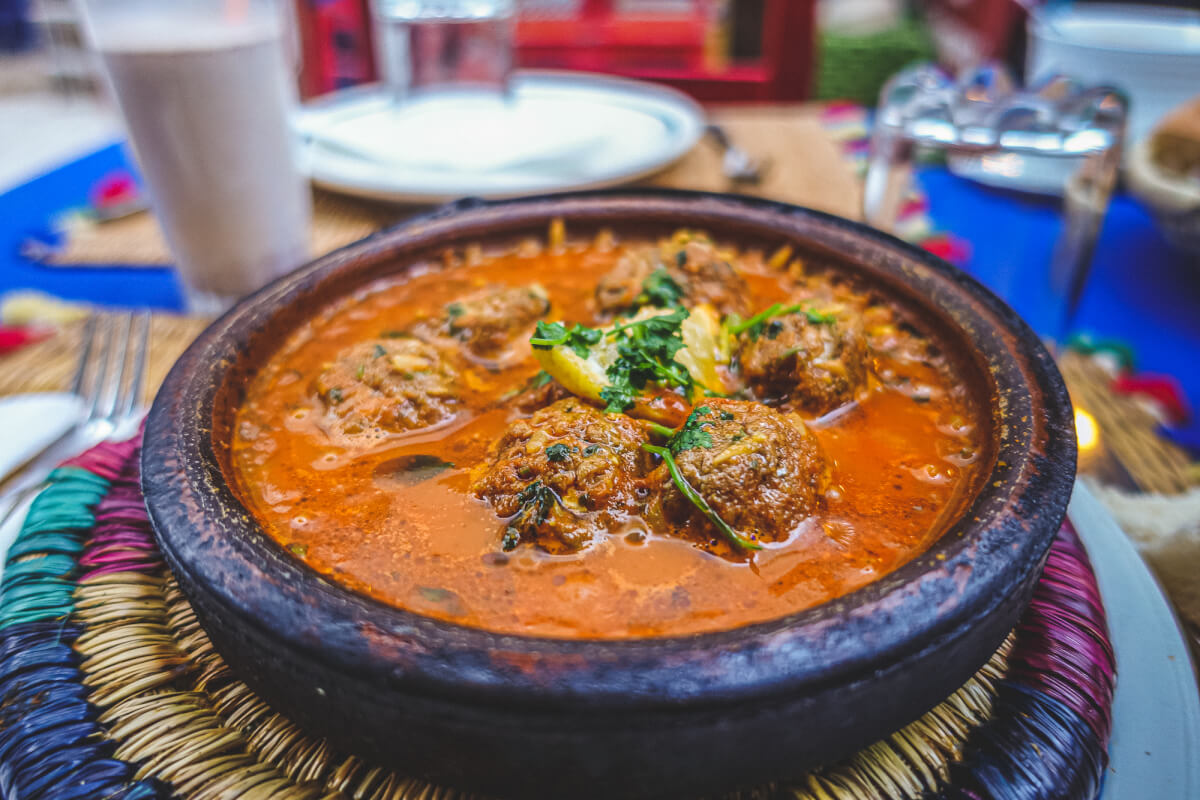
- Tangia: A stew typically made with slow-cooked lamb, garlic, and saffron. You can enjoy it with a fork or a side of vegetables, even though bread is commonly served with it. Don’t confuse this with Tajine!
- Salads: With an impressive variety of salads, Morocco offers a vibrant part of any meal.
- Grilled foods: From Kefta (grilled meatballs) to chicken and sardines, most Moroccan grilled foods are gluten-free. But watch out for Merguez sausage which may contain wheat fillers.
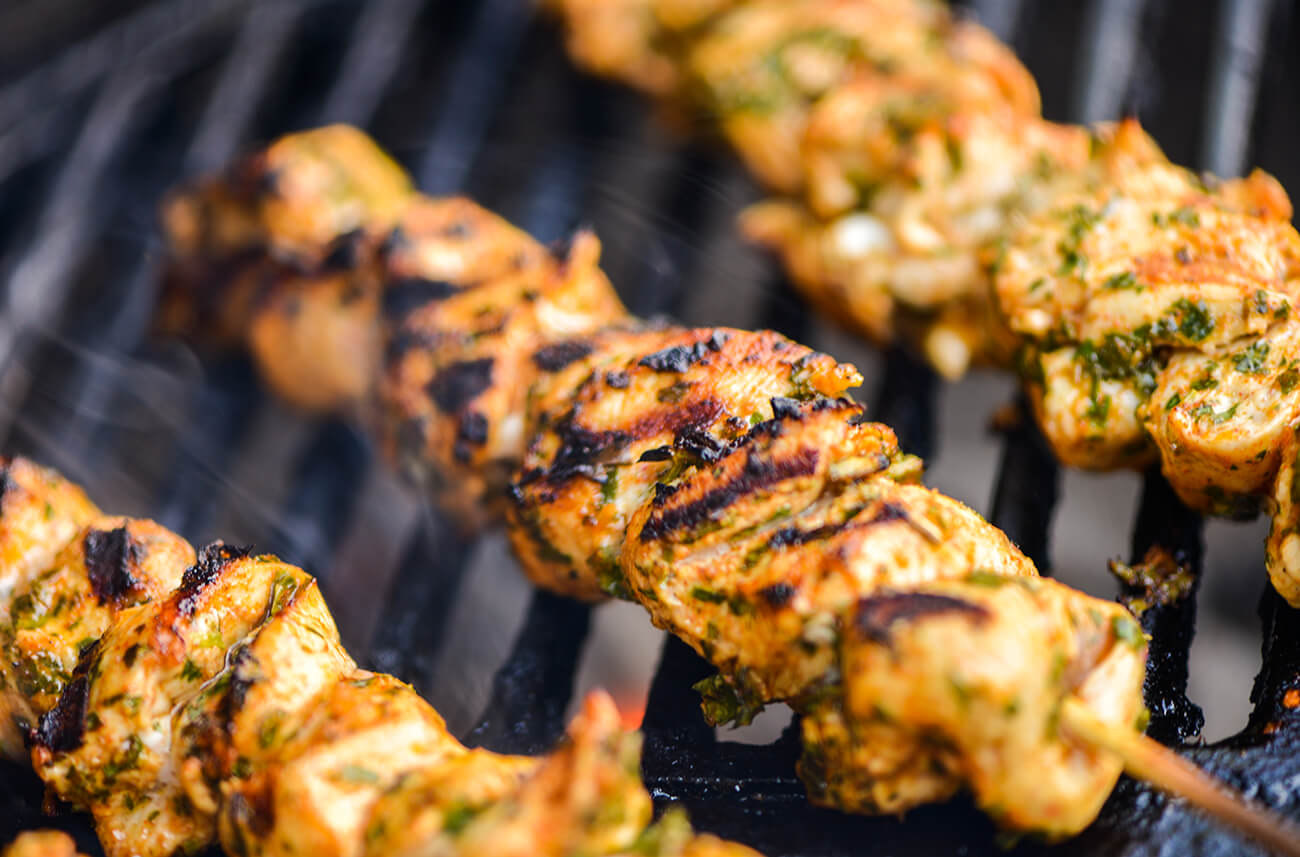
Naturally gluten-free foods
- Bssara: A nourishing fava bean puree, often served as a breakfast during cooler months.
- Beans and lentils: Delicious street food and naturally gluten-free.
- Eggs and omelettes: Always a versatile option when dining out.
- Fruit and fresh juices: Sweet, hydrating, and naturally gluten-free—Morocco’s fresh fruit and juices are a treat.
- Raib: Moroccan yogurt is another great gluten-free breakfast option.
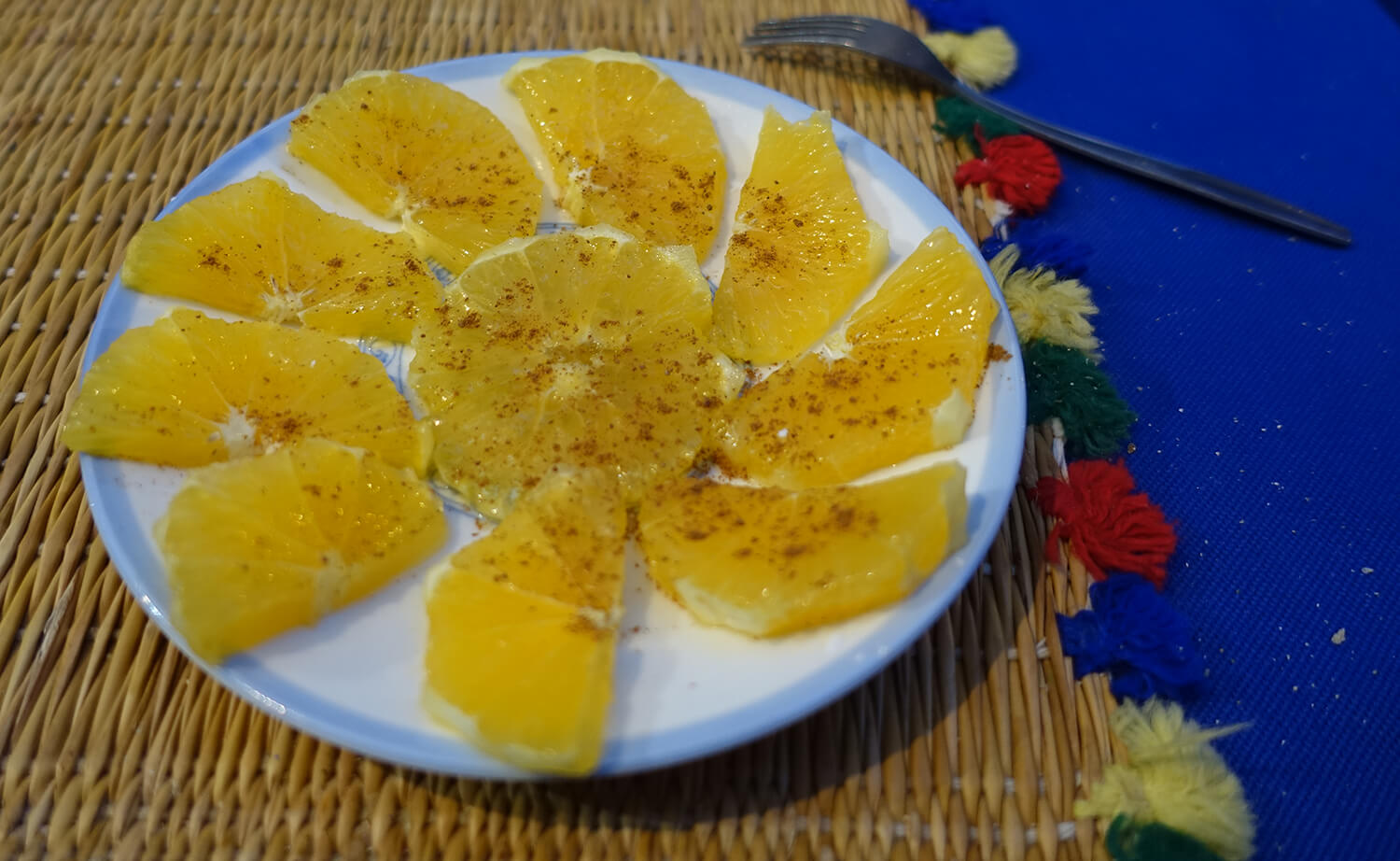
Dishes to double-check
Some traditional dishes are usually gluten-free but may include wheat-based thickeners. Therefore, always confirm before eating.
- Chermoula: A marinade for fish and seafood, made from garlic, cumin, coriander, oil, lemon juice, and salt.
- Zaalouk: A gluten-free salad made of cooked eggplant and tomato, typically eaten as a dip.
- Khlea: Preserved meat, usually served with eggs, beans, or lentils.
- Shakshuka: A breakfast dish of eggs poached in tomato, onion, and pepper sauce.
- Kalinti: A savory chickpea flour and egg dish, often sold as street food.
- Harissa: A spicy chili pepper paste, safe for celiacs, ideal for adding heat to your dishes.
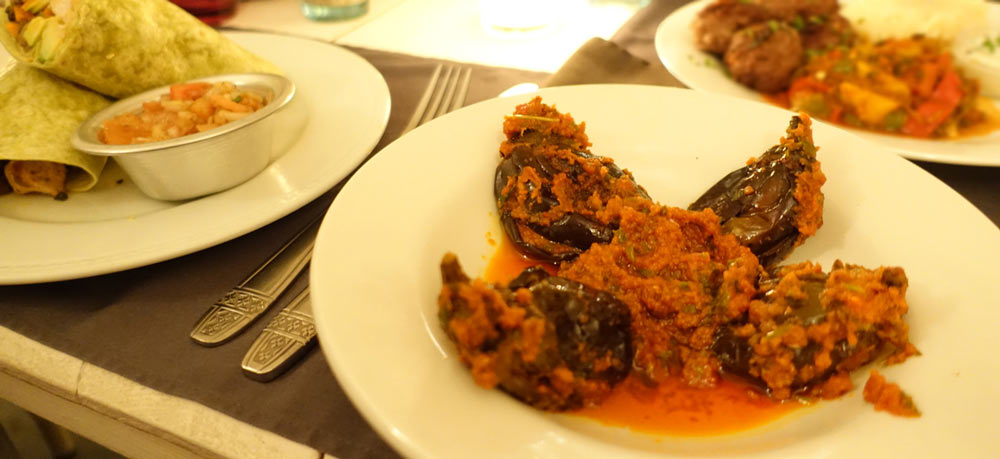
Gluten-free shopping in Marrakech
Finding suitable places to buy food is essential while sticking to a gluten-free diet. In Morocco, several stores cater to these needs:
- Carrefour: This popular supermarket chain offers a dedicated “Free-From” section, making it easier to find imported gluten-free products.
- Naturia Bio Shop: This health food store stocks a selection of gluten-free items.
- Ayaso Bio: A versatile health store where you’ll find gluten-free dry goods, freshly made juices, and even a limited range of prepared gluten-free meals.
- Souks: The traditional local marketplaces, while not specialized, are great for naturally gluten-free ingredients. Look for fresh and dried fruits, nuts, vegetables and olives, meat, poultry, and fish. The souks are ideal for finding healthy snacks and ingredients for home-cooked meals.
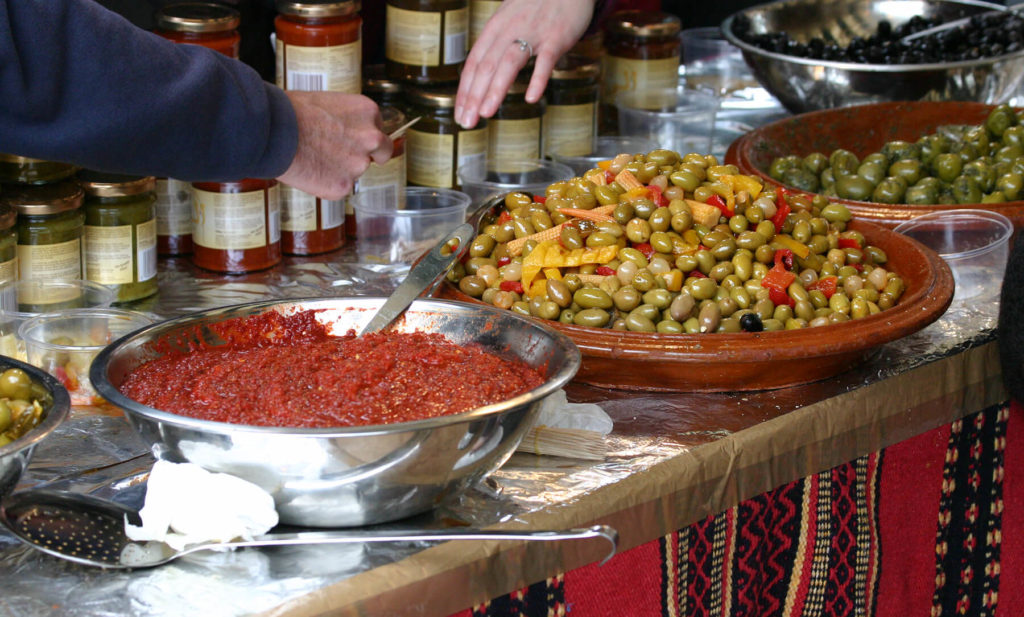
When you are shopping for packaged goods, a list of common ingredients translated into Arabic or French can help you identify gluten-free options and avoid potential allergens. Look for labels marked “sans gluten” (French for gluten-free) or ask for clarification in Arabic: “balâ ghuluten”.
In this table, you’ll find further useful translations concerning allergies:
| English | French | Darija |
|---|---|---|
| I am allergic to… | Je suis allergique… | Ana andi hassasiya mn… |
| …nuts | …aux noix | …mokassarat, lfakia |
| …eggs | …aux œufs | …lbid |
| …milk | …au lait | …Hlib |
| …dairy | …aux produits laitiers | …montajat dyal lhlib |
| …gluten | …au gluten | …Glutin |
| …wheat | …au blé | …Gemah, d’geg, Zraâ |
| …lour | …à la farine | …T’hin (t7in) |
| …urum wheat / semolina | …à la semoule | …Smida |
| …barley | …à l’orge | Chaâir |
| …rye | …au seigle | Chaâir |
| …shellfish | …aux fruits de mer | … hout dyal leqechra / fawakih lbahr |
| …fish | …au poisson | …hout |
| I am a vegetarian. | Je suis végétarien. | Ana nabati(a). |
| I do not eat… | Je ne mange pas… | Ma kanakulsh… |
| …bread | …de pain | …khobz |
| …meat | …de viande | …lhem |
| …fish | …de poisson | …hout |
| …lamb | …d’agneau / mouton | …ghnem |
| …beef | …de bœuf | …lbger |
Managing nut allergies in Morocco
While nuts are not a staple in every dish, they’re often used in Moroccan cuisine. Here’s how to handle nut allergies:
- Inform your restaurant staff or host about your allergy: Make it clear that you have a nut allergy. Nut allergies are relatively well understood in Morocco, so most hosts and chefs will be aware of the need to exclude nuts from your meals.
- Dishes to watch out for: Many Moroccan pastries contain nuts. Certain dishes like beef and prune tajine are often garnished with fried almonds.
- Stick to naturally nut-free options: Choose dishes like salads, lentils, grilled meats, or beans, which are less likely to contain nuts.
Gluten-free restaurants in Marrakech
Marrakech is home to numerous restaurants that understand food allergies, including gluten intolerance, and can adapt menus to accommodate.
Here’s a concise list of places offering gluten-free options:
- La Creperie de Marrakech: Located in Gueliz, this spot offers authentic buckwheat crepes, perfect for celiacs. Be sure to ask about potential cross-contamination.
- Pepe Nero: An Italian restaurant with gluten-free items clearly marked on its menu.
- La Mamounia Hotel’s on-site restaurants: High-end dining options with a knowledgeable staff that can accommodate celiac needs.
- Restaurant Dar Tazi: A Moroccan restaurant offering gluten-free bread, desserts, and mains.
- Henna Art Cafe: Offers gluten-free items on its menu. However, be sure to ask whether shared fryers are used for fried dishes.
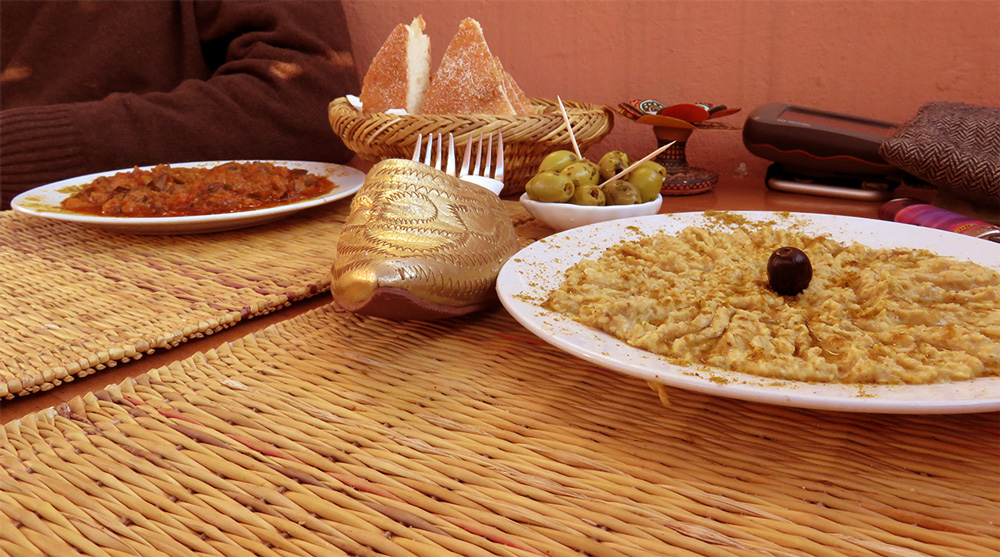
- Cuisine De Terroir: This restaurant specializes in traditional Moroccan dishes like tagine, and can cater specifically to gluten-free diners.
- Maison Sans Gluten: A 100% gluten-free bakery offering a wide range of products, including gluten-free Moroccan flatbread (msemen).
- Amal Moroccan Restaurant and Women’s Training Center: Open for lunch, this spot adjusts menus to accommodate gluten-free needs.
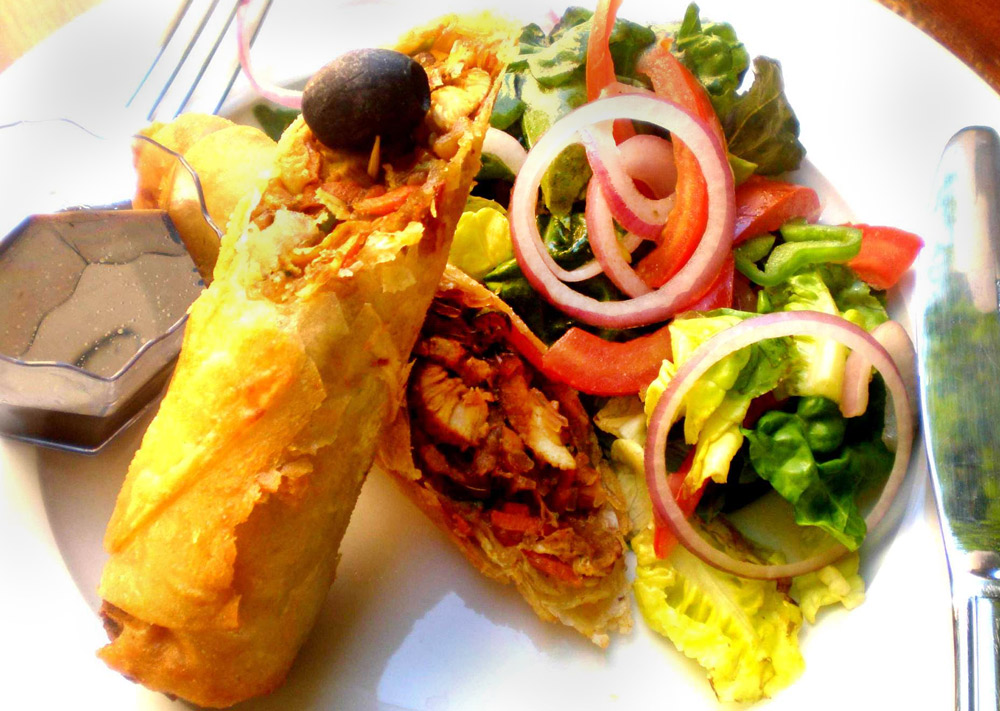
- Cafe Clock: This cross-cultural café serves dishes with clearly marked vegan and gluten-free options.
- Un Dejuner au Marrakech: A popular restaurant in the Medina with options for meat lovers, vegetarians, and those seeking gluten-free meals.
- NOMAD: This spot offers some gluten-free options, including cauliflower roast in charmoula, grilled lamb chops, and a flourless cardamom ginger orange cake.
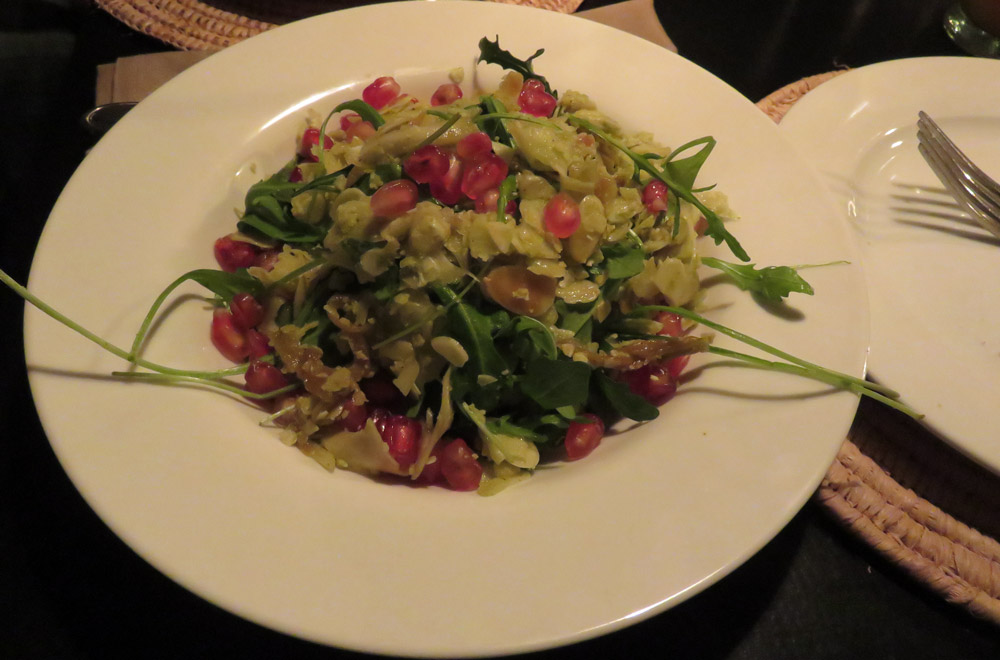
Gluten-free accommodation options in Marrakech
Traveling with dietary restrictions can be easier when your accommodation understands and supports your needs. Luckily, Marrakech offers a variety of gluten-free options.
Recommended riads
Many riads in Marrakech are willing and able to accommodate dietary restrictions, including gluten-free diets. However, it’s important to remember that awareness levels regarding gluten-free diets can vary. Here are two highly recommended riads known for their understanding of gluten-free needs:
- Riad Dar Zaman: Known for its home-cooked, high-quality meals, this riad can cater to your gluten-free requirements, whether it is breakfast, lunch, or dinner (Booking.com).
- Riad Murakush: This beautiful riad offers home-cooked meals prepared by a considerate staff. To enjoy the best experience possible, make sure to communicate your dietary needs prior to your arrival (Booking.com).
Major hotels
For those preferring larger hotels, Marrakech offers several options where staff are generally aware of gluten-free requirements. That said, substitutions may not always be available. Therefore, taking a few precautions is key:
- Communicate clearly: Inform the hotel about your dietary needs both when booking and upon check-in to ensure they are prepared.
- Be cautious with buffets: While buffet services may seem convenient, cross-contamination can pose a risk.
Notable gluten-free-friendly hotels include La Mamounia, Royal Mansour (Booking.com), and Four Seasons Marrakech (Booking.com).
Self-catering options
If you’re especially careful about maintaining a strict gluten-free diet, consider renting a riad or Airbnb. This option provides full control over your meals and allows you to shop for fresh, gluten-free ingredients.
Conclusion
Traveling to Morocco while maintaining a gluten-free lifestyle may seem overwhelming at first. But with the right preparation, it becomes entirely manageable. As highlighted in this guide, Morocco offers a variety of gluten-free dishes, reliable shopping options, and accommodations.
Always communicate your needs clearly, whether you’re dining out or staying in a riad. Don’t hesitate to ask for menu adaptations or double-check ingredients. With a bit of care, your Moroccan adventure can be just as flavorful, exciting, and stress-free as any other journey.
Frequently Asked Questions about gluten-free food in Morocco
Yes, some traditional Moroccan dishes do contain gluten, particularly those made with bread, pastries, or couscous. However, many Moroccan dishes are naturally gluten-free, such as certain tajines and salads.
Most tajine dishes are naturally gluten-free, as they are slow-cooked stews of meat and vegetables. Nevertheless, some recipes may include flour to thicken the broth. To be safe, always ask how the dish is prepared before eating.
Traditional Moroccan couscous is made from wheat flour, so it is not gluten-free. However, some places might offer alternatives made from corn or barley. If you’re unsure, ask about gluten-free options.
Most traditional Moroccan spices and spice blends, such as Ras El Hanout and harissa, are naturally gluten-free. Cross-contamination or added fillers could still be a concern. When shopping or eating out, ask to ensure the spices are pure and safe.

